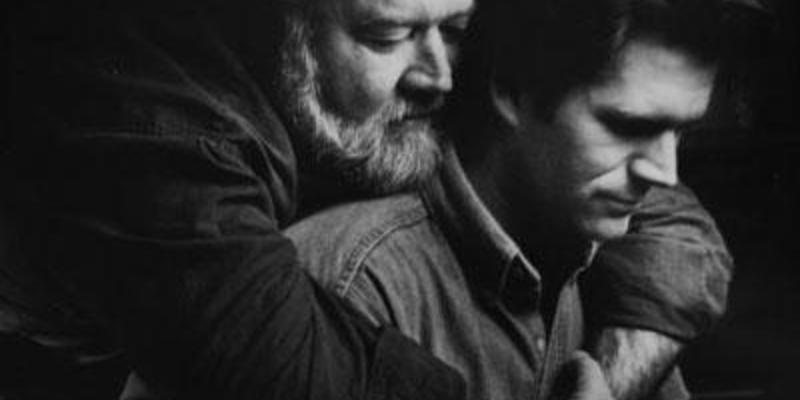
EDITORS' NOTE: This post was first published October 30, 2012. Due to travel problems as a result of Hurricane Sandy, the event was rescheduled for TONIGHT. Though it's no longer the eve of Halloween, Stephanie's metaphor is too wonderful to edit.
Tonight, on the eve of Halloween, I'll have the plastic pumpkin bucket of my mind open and ready for sweet offerings. I'll come wearing the costume of a writer (jeans, v-neck sweater, boots, pen, and moleskin notebook) and hope that morsels of wisdom drop in my bucket from that rarest of hyphenated creatures—an award-winning, best-selling, Oprah-endorsed writer, Andre Dubus III. But truthfully, I'll be paying homage to his father and namesake, the short story writer and essayist Andre Dubus.

I've actually not read House of Sand and Fog, nor seen the movie, nor read any other fiction by the handsome and celebrated son, but I have read, and loved, Dubus Senior's short stories and especially his reflections and meditations on life as a "cripple" as he dubbed himself after being crushed by a car that struck him after he stopped to help two disabled motorists outside of Boston on dark night in 1986. Dubus, with his Ernest Hemingway-rugged good looks, writes with a hard won gravitas and humble wisdom, and my copy of Meditations from a Moveable Chair is dog-eared and pockmarked with marginalia.
From the elder Dubus, in an essay titled "First Books" I've underlined this:
"But the writer who endures and keeps working will finally know that writing the book was something hard and glorious, for at the desk a writer must try to be free of prejudice, meanness of spirit, pettiness and hatred; strive to be a better human being than a writer normally is, and to do this through concentration on a single work, and then another, and another. This is splendid work, as worthy and demanding as any, and the will and reliance to do it are good for the writer's soul. If the work is not published, or is published for little money and less public attention, it remains a spiritual, mental and physical achievement; and if, in public, it is the widow's mite, it is also, like the widow, more blessed."
Andre the father was largely absent to his son while young Andre was growing up, according to Dubus III, who writes of their relationship in his memoir Townie. He was a mystery, a vacuum, a hurt. I know what that's like. And yet father and son shared this DNA of creativity, a writer's heart, and it shows through for the son. I hope to hear more about that when he speaks tonight as part of Ashley Hall's Visiting Writers Series.
For now, these nuggets (think of them as Candy Corn for the Writer's Soul) will hopefully tide you over. Wisdom for writers from Andre Dubus III, as published in Writer's Digest:
“I really think that if there’s any one enemy to human creativity, especially creative writing, its self-consciousness. And if you have one eye on the mirror to see how you’re doing, you’re not doing it as well as you can. Don’t think about publishing, don’t think about editors, don’t think about marketplace.”
“I think the deeper you go into questions, the deeper or more interesting the questions get. And I think that’s the job of art.”
"I still have my truck, and I still have my carpentry tools, and if this writing thing dries up on a publishing level—it's never gonna dry up for me on an artistic level because I'm never going to quit—but if all the sudden I were out in the cold in the publishing world, then I'm gonna build you a kitchen. I'm gonna do your roof. I would rather do that than sell my soul to the publishing devil. I just won't do it."
“Even a day writing badly for me is 10 times better than a day where I don’t write at all.”
An Evening with Writer Andre Dubus III
Ashley Hall, Tuesday, December 11, 7:00 p.m.
Sottile Thompson Recital Hall
Andre Dubus III is the author of five books: The Cage Keeper and Other Stories, Bluesman, and the New York Times bestsellers, House of Sand and Fog, The Garden of Last Days, and his memoir, Townie, a #4 New York Times bestseller and a New York Times "Editors Choice." It is named on many "Top Non-fiction Books of 2011" lists, including The New York Times, Publishers Weekly, The Library journal, Kirkus Reviews, and Esquire magazine. His work has been included in The Best American Essays of 1994 and The Best Spiritual Writing of 1999. He has been awarded a Guggenheim Fellowship, The National Magazine Award for fiction, The Pushcart Prize, and was a Finalist for the National Book Award, the Rome Prize Fellowship from the American Academy of Arts and Letters, and is a 2012 recipient of an American Academy of Arts and Letters Award in Literature.
For more information about tonight's event, contact Dr. Nick Bozanic at 843-720-2855.